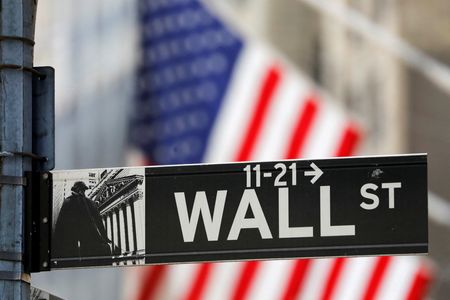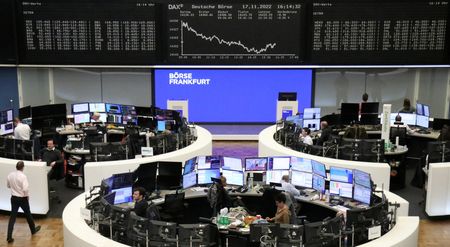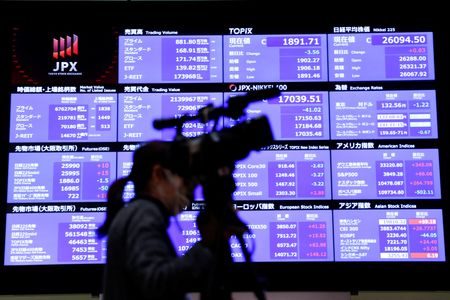By Herbert Lash and Amanda Cooper
NEW YORK/LONDON (Reuters) -Global equity markets fell and the dollar firmed on Monday after data showing a resilient U.S. jobs market suggested interest rates will stay higher for longer as central banks fight to slow inflation amid relatively strong economic growth.
Investors snapped up dollars to the detriment of emerging market assets and lower-yielding currencies like the yen after last Friday’s blockbuster U.S. jobs report for January and a strong rebound in the services sector.
Government bonds, which typically perform well when there is a dash for safe havens, sold off under intense pressure. The benchmark 10-year Treasury yield climbed to a one-month high of 3.655%, while the yield on Germany’s 10-year bond, the euro zone benchmark, hit 2.306%.
Investors have been caught between a Federal Reserve that sees interest rates rising and staying above 5% into next year, and a market that had priced in rate cuts by the U.S central bank later this year on expectations of a cooling economy.
“The market is unbelievably willing to look through 2023, and that’s the wild card here,” said Brad Conger, deputy chief investment officer at Hirtle Callaghan & Co. in West Conshohocken, Pennsylvania.
“The market is expecting a slowdown, earnings are coming down, but the market is looking out to an up year in 2024,” he said. “This is not an economy is that is going to implode right away.”
The Fed may need to lift borrowing costs higher than previously anticipated given the unexpectedly strong reading on jobs gains in January, Atlanta Federal Reserve Bank President Raphael Bostic told Bloomberg News on Monday.
Futures now price in the Fed’s target rate to peak at above 5.1% in June or July, as Fed officials had previously predicted, and then to decline to 4.83% in December, more than 30 basis points higher than befre last week’s strong data.
MSCI’s gauge of equity performance in 47 countries closed down 1.12%, while the pan-European STOXX 600 index fell 0.78%.
U.S.-listed shares of China firms fell as Sino-U.S. relations soured over a suspected Chinese spy balloon the U.S. military shot down over the Atlantic. Heavyweights Alibaba Group Holding, JD.com Inc and Pinduoduo Inc fell between 0.8% and 1.9%.
Turkey’s lira hit fresh record lows after a powerful earthquake struck Turkey and Syria, killing more than 3,000 people. The currency sank after data last week showed a worrisome increase in monthly consumer inflation.
This year’s rally in equities has been driven by hopes of a soft landing and lower inflation, but a strong labor market casts that outlook in doubt, said Anthony Saglimbene, chief market strategist at Ameriprise Financial in Troy, Michigan.
“Investors are going to have to come to grips with the fact that rates are going to stay higher for longer and it’s still unlikely the Fed is going to cut rates this year,” he said.
“Without people fearing that they’re going to lose their job, they don’t really spend less. They don’t change their behaviors enough to start bringing down inflation.”
On Wall Street, the Dow Jones Industrial Average fell 0.1%, the S&P 500 lost 0.61% and the Nasdaq Composite dropped 1%.
The dollar had touched a three-week high of 132.90 against the lower-yielding yen following reports the Japanese government had offered the job of central bank governor to current deputy Masayoshi Amamiya, viewed as less of a monetary policy hawk than his predecessor.
The dollar rose to an almost one-month high of 132.85 yen while the euro fell 0.64% to $1.0726.
The drama over the balloon, which Beijing has said was a civilian airship that accidentally strayed into U.S. airspace, further strained already-tense relations.
Chinese equities fell on Monday, while the offshore yuan touched a one-month low against the dollar. It has fallen by almost 2% in the space of three days.
“Undoubtedly, the incident is a negative headline for the market,” said Yuan Yuwei, hedge fund manager at Water Wisdom Asset Management.
The dollar’s strength also washed through emerging markets.
The Turkish lira bore much of the brunt of the risk-off mood, falling to a record low of 18.85 to the dollar, while the Thai baht posted its biggest one-day fall against the U.S. currency in over 20 years.
The earthquake adds further uncertainty ahead of elections in Turkey that most likely will be held in May, said Piotr Matys, senior FX analyst at In Touch Capital Markets.
“The Fed is likely to remain in a tightening mode for longer than the markets currently anticipate at a time when President Erdogan strongly indicated he expects the Turkish central bank to cut interest rates,” Matys said.
A host of Fed officials are set to speak this week, including Chair Jerome Powell on Tuesday, and the tone as suggested by Bostic could be hawkish. European Central Bank and Bank of England policymakers will also be making appearances.
Oil prices edged higher in choppy trading as markets weighed a return in demand from China against supply concerns and fears of slower growth in major economies curbing consumption.
U.S. crude futures settled up 72 cents at $74.11 a barrel while Brent rose $1.05 to settle at $80.99.
Gold edged higher, with investors banking on the precious metal’s safe-haven appeal as concerns about an economic slowdown linger.
U.S. gold futures settled 0.2% higher at $1,879.50.
(Editing by Deepa Babington)



